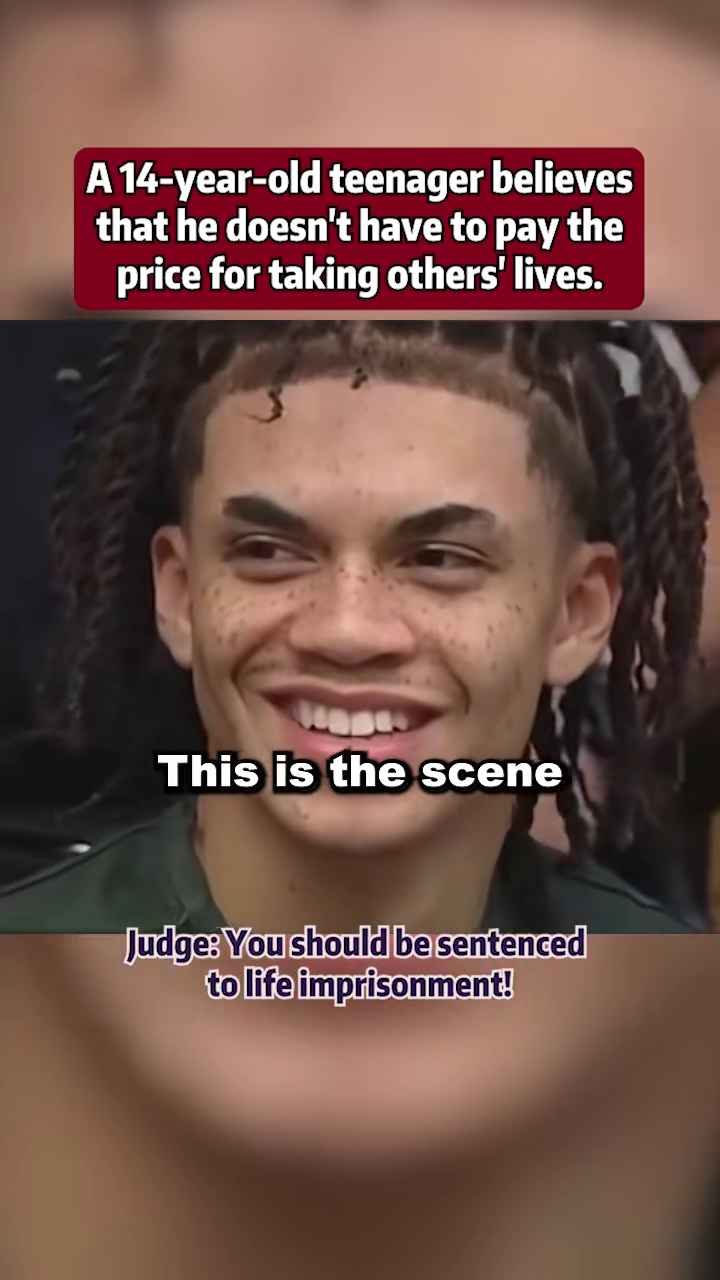The intersection of youth, crime, and justice is often a difficult and emotional space, challenging our perceptions of accountability and rehabilitation. Few cases highlight this struggle as profoundly as that of Remy Cordoba, a then 14-year-old whose involvement in a high-speed collision and subsequent fatal shooting brought him before a court and ultimately resulted in a life sentence. This case is not just a tragic legal proceeding; it is a painful examination of how society balances the need for justice for victims with the understanding of a young person’s development and potential for change.
A Night of Recklessness Ends in Tragedy
The sequence of events that led to the death of 32-year-old Pamela Cabriole began as a seemingly reckless night out for a group of teenagers. Remy Cordoba, a minor at the time, was reportedly speeding alongside his “gang accomplices.” Their irresponsible driving led to a collision involving Cabriole, an innocent motorist traveling normally through the intersection. The crash itself was a serious event, but what followed escalated the situation into an unspeakable tragedy.
As Cabriole’s vehicle was impacted, the atmosphere turned confrontational. The situation intensified when the members of Cordoba’s group began to verbally assault the victim. In a moment described in the court records as an attempt “to show off,” Cordoba took an irreversible action. He is alleged to have pulled a firearm from the car and discharged it “furiously” at Cabriole’s vehicle. The sheer speed of the escalation—from a traffic incident to a deadly assault—is a chilling detail that underscored the gravity of the offense.
Pamela Cabriole: A Life Cut Short
The consequences of Cordoba’s actions were immediate and devastating. When law enforcement and emergency services arrived at the chaotic scene, they found Pamela Cabriole critically injured. Despite efforts, her life could not be saved. The 32-year-old was a parent, leaving behind a young child who now faces life without a mother.
For the Cabriole family, the shock and grief were immeasurable. A routine drive had become the site of a fatal incident, perpetrated by a minor. The pain of her loved ones became a focal point of the subsequent court proceedings, as they sought a measure of justice for the life that was violently extinguished. The sight of a young child crying beside police vehicles became a poignant symbol of the innocent victims of the night’s recklessness.
The Courtroom Confrontation: Defense and Despair
The subsequent legal battle centered on a complex question: how should the justice system address a heinous act committed by a minor? Cordoba was arrested and brought before the court, where his defense immediately leveraged his age. He was a minor, and the law often prescribes different pathways—focusing more on rehabilitation—for juvenile offenders.
However, the nature of the act—the combination of high-speed driving, a collision, and the intentional use of a dangerous weapon—led prosecutors to pursue the most serious charges. The goal was to try and sentence Cordoba as an adult, a legal strategy reserved for the most grievous offenses committed by young people.
During the emotionally charged courtroom proceedings, the chasm between the defendant and the victim’s family was starkly evident. The video footage captured the teenager’s demeanor, which was interpreted by many as disturbingly lacking in remorse. The victim’s family, wracked with anguish, looked on as Cordoba addressed the court. In one particularly controversial moment captured in the video, Cordoba stated that he believed he should not have to “pay the price for taking others’ lives” and that he was not “the monster or the murderer” that he had been “painted to be.”
This appeal to the court, perceived by some as an attempt to evade responsibility and downplay the severity of his actions, only inflamed the emotions of the victims’ family, who were seen crying and shielding their faces in the courtroom. One family member can be heard telling the court how she sees Cordoba as a “monster, murderer”—a desperate counter to the narrative the defense was attempting to build. The public discourse surrounding the case became heavily influenced by the perceived lack of contrition from the young defendant.
The Verdict: Life Imprisonment as an Adult
Despite the defense’s efforts to protect Cordoba under the umbrella of juvenile justice, the judge ultimately made a decisive ruling. The defense’s plea to have him treated solely as a minor was rejected, and his subsequent appeal was also denied.
The judge’s decision was firm: Remy Cordoba would be sentenced to life imprisonment as an adult.
This judgment reflects a powerful legal determination that the gravity of the crime outweighed the mitigating factor of the defendant’s youth. By sentencing him as an adult, the court ensured that he would face the maximum consequences for his actions, underscoring the legal principle that heinous acts against life demand the highest form of accountability, regardless of age.
The National Debate: Is a Life Sentence Appropriate for a 14-Year-Old?
The outcome of the Remy Cordoba case immediately ignited a national debate, bringing into sharp focus the ethical and legal complexities of the juvenile justice system.
On one side are those who believe the sentence is just. Proponents argue that the act itself—a deliberate, fatal shooting following a crash—was so egregious that it demands a severe penalty. They contend that justice for Pamela Cabriole and the safety of the community necessitate that the person responsible for the klling be removed from society for life. For the victim’s family, this sentence represents the only way to acknowledge the monumental loss they have suffered.
On the other side are legal and child development experts who question the long-term appropriateness of a life sentence for a 14-year-old. They point to the developing nature of the teenage brain, which often struggles with impulse control and fully grasping the consequences of actions. They argue that a life sentence, particularly for a crime committed before the age of 18, fails to account for the possibility of profound rehabilitation and change over decades of incarceration. Many advocate for sentences that include a review mechanism or the possibility of parole, offering a pathway for release if an offender can demonstrate genuine remorse and transformation.
The case of Remy Cordoba is a difficult reminder that no outcome can restore the life that was lost. The sentencing to life imprisonment as an adult is a powerful statement about accountability for fatal acts, but it leaves an indelible mark on the debate surrounding youthful crime and the path to justice.
Conclusion
The tragedy involving Remy Cordoba and Pamela Cabriole is more than just a legal footnote; it is a painful narrative of loss, youthful recklessness, and the arduous pursuit of justice. The court’s decision to treat a 14-year-old as an adult and sentence him to life imprisonment serves as a grim warning about the irreversible nature of violence and the severe consequences that follow. As the case continues to be discussed, it compels us all to examine our own beliefs about crime, punishment, and the potential for redemption within the justice system. The ultimate question posed by the video—”Do you think this judgment is appropriate?”—remains a source of deep and necessary contemplation for society.
Would you like to search for more details about the legal precedents for sentencing minors as adults in similar cases? The video you uploaded is discussing the real-life criminal case of Remi (or Remy) Cordova, who was 14 years old when he was involved in the fatal shooting of Pamela Cabriales in Denver, Colorado, in 2021.
The central themes of the story, as confirmed by the search results, include:
- The senseless nature of the crime: It stemmed from a minor traffic collision where Cordoba, a passenger in the other car, shot into Cabriales’ vehicle with a high-powered rifle (reportedly an AR-15) multiple times, allegedly to impress gang members.
- The victim’s tragic loss: Pamela Cabriales, a 32-year-old mother and real estate agent, was kll-d and left behind a young son.
- The legal battle over juvenile vs. adult sentencing: Cordoba was initially charged as a juvenile but was subsequently tried and convicted as an adult for first-degree murder (extreme indifference) and other related charges.
- The sentence: He was sentenced to life in prison with the possibility of parole (after serving 40 years in Colorado, per one source), which is a key difference from mandatory life without parole sentences that the U.S. Supreme Court has restricted for juveniles.
- Controversy and the defendant’s lack of remorse: The video and court reports highlight Cordoba’s statements of feeling for the family’s pain but refusing to “take responsibility for something that I did not do,” claiming he was not the “monster or the m_rderer” he was painted to be.
The legal information gathered aligns with the broader context of the U.S. Supreme Court’s decisions (like Miller v. Alabama and Roper v. Simmons) that restrict the harshest penalties for juvenile offenders, particularly banning mandatory life without parole for those under 18, which is why Cordoba’s “life sentence” still includes the possibility of parole.

